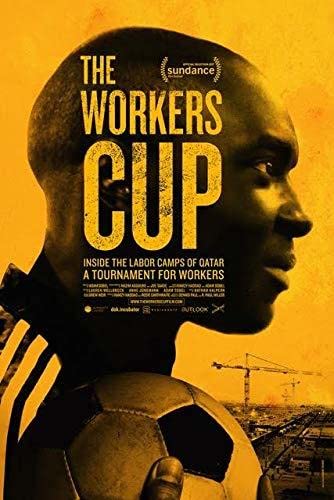
In 2022, Qatar will host the FIFA World Cup and its stadium is being built by 1.6 million migrant workers. Sixty percent of the workers are some of the world’s poorest people like India, Nepal, and Bangladesh. They work tirelessly to ensure that the one of the world’s biggest events can be held in the world’s richest country.
The Workers Cup focuses on a select amount of workers who are chosen to compete in The Workers Cup, a football tournament for laborers. The tournament is sponsored by the 2022 World Cup and 24 construction companies were invited to select teams of laborers to compete against one another. The company that is the main focus of this documentary is GCC (Gulf Contracting Corporation). As we learn about the players chosen for the GCC team, we see how they try to make the most of their dire situation. They may feel uplifted by the camaraderie that playing sports brings. But off the field, they work long hours while living in isolated labor camps, working tirelessly to make the dreams of the World Cup players come true by building the stadium.
Even though these laborers face harsh working conditions, director Adam Sobel never aims for sentimentality by heavily focusing on the harshness of their situation. The laborers do talk about how they live on a minimal salary and don’t get to enjoy life’s privileges. But Sobel mainly focuses on how they come together when they’re on the field. There are also sequences of them singing and dancing to help give the film some levity.
The simplicity of The Workers Cup allows it to get to the heart of why people plays sports in the first place. It’s not just to hear the screaming spectators or the feeling one gets when they score a goal. One reason people play sports is to come together. Here, we have people from different nations uniting to achieve a common goal (no pun intended). They do have some conflict as the documentary progresses. But these workers still are united by the need to give their lives a new purpose.
Because we don’t get a heavy glimpse of the working conditions the players face, some may feel that it is a major narrative flaw and doesn’t provide proper insight into the workers’ motivations for playing sports. But I feel that it’s meant to focus on the general togetherness that playing a sport brings.
By the time the film ended, it got me thinking about what the future holds for these migrant workers. Once the tournament ends and they go back to their normal lives, what happens next? Do they continue trying to get back on the playing field? Where do they go from there?
Neither sentimental nor filled with heavy dramatic stakes, The Workers Cup is a straightforward demonstration of why people decide to play sports. It may be seen as too straightforward by some. But its focus on togetherness may be enough for other viewers. If you check this one out, make of it what you will.